MercoPress. South Atlantic News Agency
Economy
-
Thursday, May 23rd 2013 - 07:16 UTC
Europe’s three largest economies call for stricter rules on corporate tax avoidance
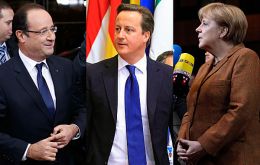
Britain, France and Germany called for stricter rules to stop companies such as Google, Apple and Amazon aggressively avoiding taxes in austerity bitten Europe, while acknowledging they had done nothing unlawful.
-
Thursday, May 23rd 2013 - 07:01 UTC
Cristina Fernandez administration limits overseas dollar extractions to a minimum
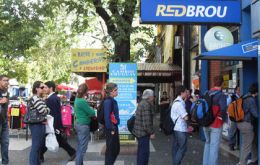
Continuing with the so called ‘dollar clamp’ Argentine institutions issuing credit cards will further limit the extraction of dollars from automatic cashiers: travellers to neighbouring countries will only be allowed 100 dollars every three months and those visiting non neighbouring countries, 800 dollars per month.
-
Thursday, May 23rd 2013 - 02:13 UTC
Rest cool, toilet paper is on the way for the beleaguered Venezuelan consumers
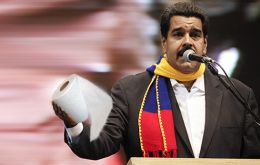
Venezuela's National Assembly approved a 79 million dollars credit for the import of toilet paper, toothpaste and soap. The measure comes after Venezuela hit the news with its dire toilet paper shortage.
-
Thursday, May 23rd 2013 - 02:10 UTC
Argentine ports strike stalls oilseed and grains exports at peak harvest time

Argentine longshoremen on strike at the peak of summer harvests exports have scores of grains ships delayed in and around due to a three-day-old conflict that threatens to bog down shipments at a time of heightened world demand for South American soy and corn, according to industry sources.
-
Wednesday, May 22nd 2013 - 23:03 UTC
US airline closes 4bn dollars deal with Brazil’s Embraer for 40 commuter aircraft

United Airlines partner SkyWest Inc. agreed to buy more than 4 billion dollars of Brazil’s Embraer jets as new pilot contracts at the largest carriers allow commuter operators to fly bigger planes.
-
Wednesday, May 22nd 2013 - 18:14 UTC
Uruguay’s booming construction industry anticipates a tough year ahead

The investment in the construction industry in Uruguay soared 26.45% last year over 2011 and reached seven billion dollars, of which 40% correspond to the Brazilian-Chilean pulp mill, Montes del Plata, the country’s largest investment in years equivalent to 2 billion dollars. However there are storm clouds ahead.
-
Wednesday, May 22nd 2013 - 18:09 UTC
Quarter of Italians edging the poverty line and most youngsters survive thanks to Mon and Dad
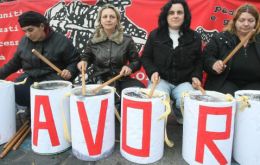
One out of four Italians up to 40 years of age survive with the help of their parents, according to a report on “Youth and the crisis” released this week in Milan. Another report from the Italian national statistics institute (ISTAT) says millions of Italians have or are close to falling below the poverty line.
-
Wednesday, May 22nd 2013 - 18:00 UTC
China/Latam trade expanded 8% in 2012 and region’s deficit jumped to 6.6bn
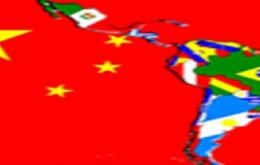
Latin America's trade deficit with China jumped to 6.6 billion dollars last year from only 150 million in 2011, according to an analysis by online publication Latinvex based on new data from the IMF. Total trade between China and Latin America grew 8% last year to 255.5bn which means the region’s trade with China is growing faster than with the United States, 6.2%.
-
Wednesday, May 22nd 2013 - 17:55 UTC
“Fed not ready to take its foot off the gas”, Bernanke tells the US Congress
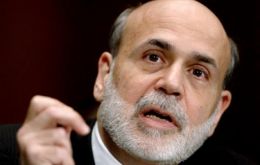
The Federal Reserve's monetary stimulus is helping the US economy recover, and the central bank needs to see further signs of traction before taking its foot off the gas, central bank chairman Ben Bernanke said on Wednesday.
-
Wednesday, May 22nd 2013 - 06:03 UTC
Uruguay: Mujica on a most ambitious mission to China after investments for ports and railways

Uruguayan President Jose Mujica begins on Wednesday the longest and most ambitious of his overseas trips hoping to convince China to invest in infrastructure projects that are crucial for the development of the country and its foreign trade: a deep water port and recovering the rail cargo network.
